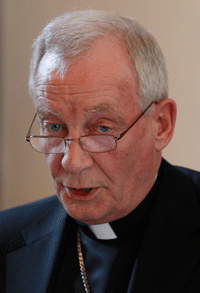The Catholic bishops of England and Wales welcomed new guidelines governing prosecutions in assisted suicide cases, saying that the most vulnerable people are better protected under the revisions. Archbishop Peter Smith of Cardiff, Wales, praised Keir Starmer, director of public prosecutions, for revising the guidelines in a way that removed some of the provisions that were most dangerous for the sick and vulnerable.
“Our particular concerns were that the interim guidelines gave less protection under the law to disabled or seriously ill people and to those who had a history of suicide attempts and were likely to try again,” Archbishop Smith said in a statement on Feb. 25. “There also appeared to be a presumption that a spouse or close relative would always act simply out of compassion and never from selfish motives,” he said.
“These factors have been removed from the new guidelines, which now give greater protection to some of the most vulnerable people in our society,” he said. “There is also a greater stress on the fact that the law has not changed, that all cases will be investigated and that no one is being given immunity from prosecution under these guidelines.”
Starmer was instructed to produce new guidelines following a July ruling in the House of Lords, Britain’s highest court, in a case brought by Debbie Purdy, a West Yorkshire political activist who has multiple sclerosis. Purdy demanded to know if her husband would be prosecuted if he helped her to travel to the Dignitas euthanasia clinic in Switzerland to commit suicide.
The court’s ruling required Starmer, as Britain’s chief prosecutor, to spell out exactly how the state would respond if someone helped a person to commit suicide. More than 100 British citizens have killed themselves in the Swiss clinic, but there has not been a single prosecution of anyone who has accompanied them. Under British law, the offense is punishable by up to 14 years in jail.
In November the bishops publicly criticized Starmer’s interim guidelines for allegedly creating categories of people whose lives would be legally considered less worthy of protection than the rest of society. They said the draft guidelines stigmatized the disabled, the terminally ill, the depressed and the aged and “could encourage criminal behavior” by signaling that it was acceptable to help such people to kill themselves.
The new guidelines insist that assisted suicide is a crime but set out six factors that would make prosecution unlikely, including instances when the suspect was “wholly motivated by compassion” and when the patient had a determined wish to commit suicide. Sixteen factors would favor prosecution. They include pressure on the victim, a lack of informed consent, a history of abuse by the suspect or if the suspect was unknown to the victim. Starmer told reporters Feb. 25 that the revised policy “is now more focused on the motivation of the suspect rather than the characteristics of the victim.”
The revisions were still criticized by Paul Tully of the Society for the Protection of Unborn Children, a pro-life lobby group, who said in a statement on Feb. 25 that the element of implicit discrimination against the aged, disabled and sick “is more subtle, but it is still there.”








